|
|
|
Sort Order |
|
|
|
Items / Page
|
|
|
|
|
|
|
| Srl | Item |
| 1 |
ID:
120317
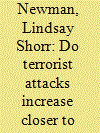

|
|
|
|
|
| Publication |
2013.
|
| Summary/Abstract |
The shadow of violence that elections cast remains poorly understood. A key obstacle impeding cross-national empirical analysis of electoral violence has been the varied nature of such violence. To address this challenge, I examine terrorist attacks as one particular form of electoral violence. By tracking the incidence of terrorist violence relative to election dates over time and across countries using an original dataset for the period from 2000-2005, I find strong support for the hypothesis that terrorist violence increases as we move closer to an election date. In fact, terrorist violence approximates a normal distribution centered on the election date.
|
|
|
|
|
|
|
|
|
|
|
|
|
|
|
|
| 2 |
ID:
120319


|
|
|
|
|
| Publication |
2013.
|
| Summary/Abstract |
Why do some terrorist groups participate in the electoral process but not others? If elections provide some strategic or tactical benefit then we would expect other groups to emulate that strategy. However, we see variation in the adoption of an electoral strategy by terrorist groups. I argue that involvement in territorial disputes and group competition determine whether terrorist groups embrace an electoral strategy. Conflicts involving territorial disputes are more likely to see terrorist groups contest elections because electoral participation may aid in the creation of the independent or autonomous territory they desire. Increased group competition changes the number of actors, which impacts the level and distribution of resources (supporters, finance, and arms) involved in the conflict. When multiple terrorist groups compete, groups are motivated to participate in elections in response to new competitive pressures. This argument is tested using a large-n dataset of 89 terrorist groups in existence during the years 1968-2006 and a case study of Hamas's decision to contest elections.
|
|
|
|
|
|
|
|
|
|
|
|
|
|
|
|
| 3 |
ID:
120320
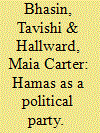

|
|
|
|
|
| Publication |
2013.
|
| Summary/Abstract |
Why do violent movements participate in elections? To answer this question, we examine Hamas's formation of the Reform and Change Party and its iconic victory in the 2006 elections to the Palestinian Legislative Council. We argue that Hamas's formation of this party was a logical step, following nearly two decades of participation in local and municipal elections. Hamas's need to attract resources from external donors, who make funding decisions based on civilian support for the movement, best explains why Hamas decided to participate in local elections in the early 1990s, taking Hamas on a path that eventually led to its 2006 legislative victory. Hamas's foray into elections was consistent with its dual strategy of directing violence against Israel and building Palestinian support through welfare services. We demonstrate that changes in political opportunities (Fatah's decline and the increase in Hamas's popularity), institutional incentives (lax electoral laws and the holding of municipal elections), and the rise of moderate voices within Hamas explain the timing of its entry into legislative elections. Finally, we discuss Hamas's electoral victory, the need for cooperation between Fatah and Hamas, and the role played by international actors as significant factors influencing prospects for peace and democratization in the region.
|
|
|
|
|
|
|
|
|
|
|
|
|
|
|
|
| 4 |
ID:
120316
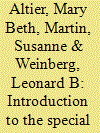

|
|
|
|
|
| Publication |
2013.
|
| Summary/Abstract |
At a White House banquet held in his honor in March 1954, Winston Churchill observed that it was better to "jaw-jaw" than "war-war." In the Cold War atmosphere of the time (Stalin had died the previous year), Churchill was maintaining that talking with the Soviet leadership was better than a nuclear confrontation between the two superpowers. Who would argue otherwise?
|
|
|
|
|
|
|
|
|
|
|
|
|
|
|
|
| 5 |
ID:
120321


|
|
|
|
|
| Publication |
2013.
|
| Summary/Abstract |
We deal in this article with the relationship between ETA attacks and electoral support for Batasuna, its political wing. We show that the relationship is twofold, since the geographical distribution of electoral support for the terrorists affects the location of ETA attacks, but violence also influences electoral support for the terrorist cause. On the one hand, when ETA chooses a location for its attacks, it takes into account the electoral strength of Batasuna. Our results show that the higher the vote for Batasuna in a municipality, the more likely members of the security forces will be killed there. With regard to the targeting of civilians, the relationship is curvilinear. ETA kills civilians in municipalities that are polarized, where support for Batasuna falls short of being hegemonic. On the other hand, our results also show that ETA attacks have an effect on the size of its support community. When ETA kills members of the security forces, voters punish the Batasuna party electorally. In the case of civilians, it depends on the specifics of the various campaigns. We find that when ETA kills informers and drug-dealers, the vote for Batasuna increases. ETA's killing of non-nationalist politicians, however, decreases Batasuna's vote share.
|
|
|
|
|
|
|
|
|
|
|
|
|
|
|
|
| 6 |
ID:
120322
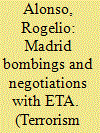

|
|
|
|
|
| Publication |
2013.
|
| Summary/Abstract |
This article analyzes the impact that two terrorism-related matters had on Spanish politics and electoral processes in the country. First, the article analyzes the terrorist attacks perpetrated by jihadists on March 11, 2004, three days before Spain's general election. The indiscriminate, lethal attacks caused a state of shock in the country, brought the election campaign to a sudden end, and led to the defeat of the party in power. Second, the article analyzes the negotiations entered into with the ETA terrorist organization by the new government during its first term, from 2004 to 2008. This controversial step, upheld by the Spanish government despite massive opposition by civil society and the main opposition party, failed to bring about the end of ETA. Both the Madrid attacks and the negotiations with ETA were responsible for the breakdown of the consensus in regard to terrorism that had existed among the main Spanish political parties. The article analyzes how both events generated an unprecedented level of polarization and tension among political parties and society from 2004 to 2008, and how each event had a different impact on the general elections held during that period. The period under examination provides an example of adversarial politics; terrorism was highly influenced by the management of both events by the main political players.
|
|
|
|
|
|
|
|
|
|
|
|
|
|
|
|
| 7 |
ID:
120318
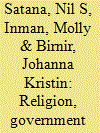

|
|
|
|
|
| Publication |
2013.
|
| Summary/Abstract |
When ethnic minority parties are excluded from government coalitions, are group attributes such as religion related to the groups' use of political violence? We argue that extremist factions within minority groups make use of divergence in religion to mobilize support for violent action when the group is excluded from government. Thus, we posit that while religion per se is not a source of violence, extremist elements of ethnic minorities, whose religion differs from the majority, may use religious divergence to mobilize group members to perpetrate terrorism. Specifically we test the hypotheses that extremist factions of an excluded group will be more likely to carry out terrorist attacks when the group's members belong to a different religion as well as when they belong to a different denomination or sect of a religion than the majority. To test these propositions, we use data on ethnic minority party inclusion in government coalitions, ethnic minority group religion, and the Global Terrorism Database (GTD) by matching perpetrators with ethnic groups for all democracies, 1970-2004.
|
|
|
|
|
|
|
|
|
|
|
|
|
|
|
|
| 8 |
ID:
120323


|
|
|
|
|
| Publication |
2013.
|
| Summary/Abstract |
What purpose do elections serve in authoritarian states? Scholars often describe these elections as "safety valves" to contain opposition groups. Though we often use this safety valve terminology, it remains an abstract concept without sufficient empirical testing. In a study of the 2009 local elections in Morocco, I show how this safety-valve process played out in real politics. This article makes the case that the Moroccan regime undertook activities in an effort to weaken the Justice and Development Party (PJD), an Islamist opposition party. Using 20 original interviews and over 100 Arabic primary documents, I delineate the ways in which regime elites manipulated electoral rules and formal institutions, especially loyalist political parties, in an attempt to undermine the Islamists' power between 2007 and 2010. I also examine how Arab Spring unrest turned back many of these efforts, empowering the PJD to secure a sweeping victory in the 2011 parliamentary elections. I conclude by discussing how scholars may reconsider safety-valve elections in authoritarian regimes as sequenced processes rather than one-time events. This case study of Morocco generates a new theory of safety-valve elections testable in other contexts.
|
|
|
|
|
|
|
|
|
|
|
|
|
|
|
|
|
|
|
|
|